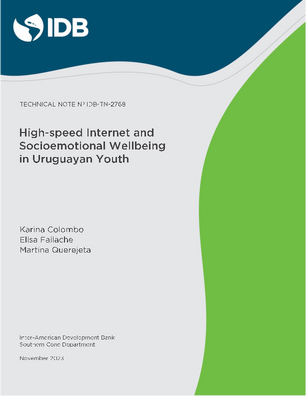High-Speed Internet and Socioemotional Wellbeing in Uruguayan Youth
Date
Nov 2023
This paper analyses the causal effects of exposure to high-speed internet on socioemotional wellbeing in adolescence and youth. We exploit the geographic and cross-cohort differences in fiber optic accessibility given by the fiber-optic-to-the-home (FTTH) project developed in Uruguay in the period 2011-2018. We identify intention-to-treat effects by combining administrative data on FTTH rollout with large survey data specially designed to collect outcomes in youth. Our results show that access to high-speed internet has mixed effects on mental health. Going from 0 to a 100% probability in FTTH accessibility reduces the incidence of feeling lonely in 9 percentage points (pp) but increases the incidence of feeling worried in 9 pp. We also find an increase in the probability of having a medical visit in 10 pp, without statistically significant effects in visits to a psychologist or psychiatrist. Our results further evidence an increase in the probability of alcohol and marijuana consumption, showing that internet access can also affect risky behaviours. The analysis of heterogeneous effects by gender, age, region of residence, and educational background shows that, while the effect on feeling worried is observed across all sub-samples, the reduction in loneliness is mostly explained by boys, individuals under 18, and with lower educational background. Dissatisfaction with their way of being emerges as the leading mechanism behind the detrimental effect on feeling worried. We do not find any evidence on FTTH access displacing offline recreational activities at the extensive margin.




